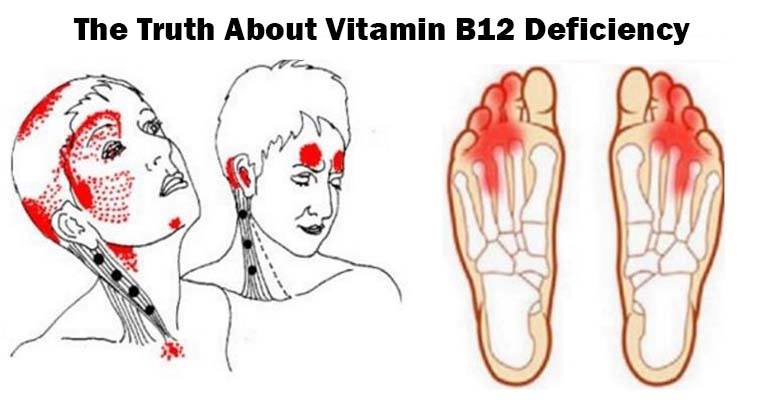Most people are trying to get their hormones balanced, and almost everyone forgets that vitamin B12 plays an essential role in every process in the body.
Let’s be honest, it’s often overlooked, and some people don’t even know that this vitamin exists.
The lack of vitamin B12 causes neurological issues and chronic diseases. Learn how to recognize the early symptoms of vitamin B12 deficiency, and prevent greater damage.
In this article we will also give you the richest food sources of vitamin B12, and maybe you will finally understand its power.
- Digestion
Vitamin B12 stimulates the production of digestive enzymes, and contributes to the breakdown of foods. It improves metabolism, and boosts the growth of friendly bacteria, while keeping dangerous bacteria away from the system.
This vitamin prevents Candida overgrowth, inflammatory bowel disease, and other digestive issues.
- Nerve damage
Vitamin B12 is important for the myelin layer of nerves. This layer protects the nerves from toxic matter and free radicals. Improperly functioning myelin exposes nerves to serious damage and leads to nerve disorders. “Dead” nerves interrupt the pathway of signals in the brain.
- Heart
Heart disease is a leading cause of death in the United States. High homocysteine levels lead to heart disease. The non-protein α-amino acid triggers inflammation, but sufficient amount of vitamin B12 can prevent this. Vitamin B12 lowers homocysteine level.
- Energy
Vitamin B12 supports healthy cells, and gives you energy. When the body lacks it, cells become weak. Your metabolism needs a healthy dose of vitamin B12 in order to convert carbs into glucose, known for its role in the production of energy. The lack of this vitamin leads to fatigue.
- Bones
Vitamin B12 can do wonders to patients diagnosed with osteoporosis and other bone problems, due to its ability to lower homocysteine levels.
- Erythrocytes and anemia
Vitamin B12 takes part in the production of erythrocytes, and prevents megaloblastic anemia. This condition is accompanied with weakness and chronic fatigue.
Symptoms of vitamin B12 deficiency
- Weak muscles
If carrying a bag is too hard for you, consider boosting your vitamin B12 intake. Your muscles don’t get enough oxygen, and become weak.
- Vision issues
Long-term deficiency affects vision. Have you ever heard of optic neuropathy? The lack of vitamin B12 will damage your optic nerves and make your eyes sensitive to light. You may also experience blurred/double vision and shadows.
- Dizziness
Do you often feel dizzy? If yes, your vitamin B12 level is too low. You may feel dizzy when you stand up too fast or take the stairs.
- Fatigue
Vitamin B12 deficiency will make you tired for no reason. The poor production of erythrocytes affects the amount of oxygen your body receives, and you end up being tired all the time.
- Pale skin
Pale skin is a common sign of vitamin B12 deficiency. Your body produces more bilirubin, and your face turns pale.
- Memory issues
Chronic deficiencies will make you forget things. This has nothing to do with dementia or Alzheimer’s disease.
- Pins and needles
The lack of vitamin B12 causes paraesthesia. It’s the pins and needles you feel in your body, especially in your hands and feet. Your nerves are damaged and you feel intense prickling, tingling and even numbing.
Foods rich in vitamin B12
- Beef and chicken liver — 81 milligrams in 3 ounces
- Salmon — 19.5 milligrams in 108 grams (1 filet)
- Herring —18.7 milligrams in 143 grams (1 filet)
- Mackerel — 15.3 milligrams in 3 ounces
- Sardines — 13.3 milligrams per 1 cup
- Tuna — 9.3 milligrams in 3 ounces
- Trout — 9.1 milligrams in 1 filet
- Organic yogurt — 1.3 mg in 1 container of plain Greek yogurt
- Turkey — 1.1 milligrams in 3 ounces
- Raw milk — 1 milligram per 1 cup
- Beef tenderloin — 0.9 milligrams in 3 ounces
- Lamb — 0.8 milligrams in 3 ounces
If you are looking for other sources of vitamin B12, consider eating more cheese, cereals, plant-based milk (almond, coconut, soy) and nutritional yeast.
Vitamin B12 is important for your body, and try to remember it. Recognize the early symptoms of its deficiency to prevent serious health problems.
Source: healthandlovepage.com
